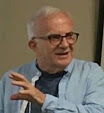My Dad had been a Methodist lay preacher. After I moved north to attend Princeton Seminary, he took over a little church in Wardensville that I had served. “Like son, like father,” he liked to say. One summer evening he gave a sermon in our hometown church. It happened to be taped. That particular homily was about the Good Samaritan.
“Never waste an audience,” someone told him. Well, he didn’t. His plain speech, earthy humor and common sense are abundantly apparent on that tape. Since Dad himself was always going the extra mile for folks who needed help, the integrity in that speech must touched the hearts of his listeners. He loved the Bible. He loved a good story. He loved charming people into faithfulness.
After a routine dental appointment he suffered a massive stroke that left him paralyzed, speechless, and with limited comprehension. We had to transport him and my mother to Utah where my sister lived. No one else could provide the quality of care and advocacy that they needed.
I felt all the conflicting emotions one would expect when I flew out from Minnesota to visit: tenderness, fear, helplessness, love, guilt, anger, appreciation. Once so energetic in his caring for others, now he lay in his bed or sat in his wheel chair for hours. Once so spontaneous and playful, now his daily life was organized by the routines of institutional care. Yet even here there was so much more to him than disability and confinement. The many “disciplines” of his previous life continued to serve him well: his enjoyment of simple things like colored glass, his friendly way with others, his patient disposition. And, almost certainly, his faith.
Dad listened frequently to that recorded sermon. Because of the damage the stroke inflicted to his brain, he heard it for the “first” time every time it was played. A kind of "beginner’s mind" perhaps. The voice on the tape, his own voice, came from twenty years earlier and two thousand miles away. With nary a thought of Utah, strokes or nursing homes, that voice spoke of a life well lived, a life lived for others. It spoke with the conviction of one who knew that we cannot know what the future holds, but who believed that God is good.
Each time he heard it, my father smiled. He nodded his approval of yesterday’s father’s words. Never an erudite historian, nevertheless Dad excelled at “planning today for the yesterday of tomorrow”.











